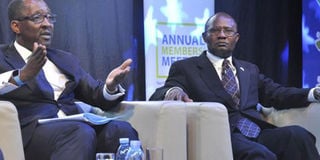NSSF doing less to spur growth - civil society

Civil society organisations led by Civil Society Advocacy Budget Group have said NSSF has done little to spur economic growth given that it holds one of the largest portfolios in Uganda. FILE PHOTO
What you need to know:
ACCESSING CREDIT
According to Mr Wilbrod Owor, the Uganda Bankers Association executive director, banks need to make it easy for borrowers to access credit.
Civil society organisations led by Civil Society Advocacy Budget Group have said NSSF has done little to spur economic growth given that it holds one of the largest portfolios in Uganda.
In a report by The East African recently, Mr Julius Mukunda, the Civil Society Advocacy Budget Group executive director, said National Social Security Fund (NSSF), which holds a portfolio of about Shs9.6 trillion, has not translated the money it holds into real development for Uganda.
“There is nearly Shs6 trillion ($1.6b) lying idle on NSSF accounts that could have been invested in infrastructure projects which would have lowered the cost of government borrowing,” he said.
Challenged
However, Mr Patrick Byabakama, the NSSF chairman, challenged Mr Mukunda assertions, saying the Fund is doing what it can within the laws and has the potential to do more.
“We could do more if we also could get more savings from the people. It should be more. At least 20 per cent of GDP (gross domestic product). Our GDP is about $28b (Shs101.8 trillion). If we say 20 per cent, we should have a minimum of $6b (Shs23.2 trillion). But we have only $2.5b (Shs9.6 trillion),” he said.
Part of the problem, Mr Byabakama said, is the current law that constrains the Fund from providing short and medium term financial needs, which has been an outcry for a number of savers over the years.
According to Mr Mukunda, whose argument has severally been voiced by other stakeholders, NSSF should find a way through which it can assist small contributors by setting up a credit fund that can advance up to Shs10m to such businesses.
However, the law limits NSSF from setting up such a Fund.
According to Mr Richard Byarugaba, the Fund’s managing director, there is about Shs30 trillion available to government for borrowing and investment out of which Shs20 trillion is held by commercial banks for short term lending and Shs10 trillion is available for long term investment in companies, mortgages and real estate.
NSSF is Uganda’s largest institutional investor with more than 17 per cent of its money held in companies listed on stock exchanges.
Mr Byabakama said the Fund was ready to participate more in funding economic development, especially through the Small and Medium Enterprise space which accounts for 90 per cent of Uganda’s private sector.
“We intend to give out 20 per cent of our money to private sector including large, medium and small companies but the biggest safety net would be for SMEs to list on the stock exchange and also improve their corporate governance because some people do not want to show us their records,” he said.
NSSF has also played a big role in providing funding for infrastructure projects by availing large sums of money for both government and private companies.
Mr Byabakama said whereas the Fund would want to do more it can only provide what is within its means.




